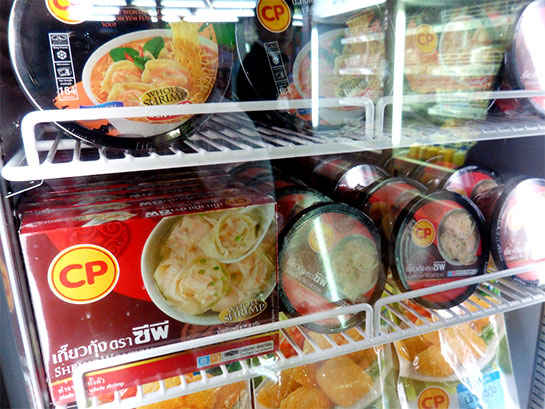The impact of early mortality syndrome (EMS) disease, which could reduce Charoen Pokphand Foods’ (CPF) supply of shrimp for processing into value-added frozen products by up to 50% this year, is reflected in the Bangkok, Thailand-headquartered company’s third quarter and nine-month performance reports. EMS, also known as hepatopancreatic necrosis syndrome, has been decimating harvests of farmed shrimp in Asia and other regions for several years now.
“The effect of EMS on Thailand’s shrimp industry and CPF’s shrimp business was more severe than expected,” confirmed CEO Adirek Sripatak in a statement released on November 12. “Moreover, the recovery of the shrimp industry has been hampered by higher shrimp prices due to less supply in the market, which affected the cost of shrimp processing.”
 Farm-raised shrimp is a key ingredient for high-profile frozen ready meals sold by CPF in the Thai market as well as abroad. Wonton Soup is a big hit among such product.
Farm-raised shrimp is a key ingredient for high-profile frozen ready meals sold by CPF in the Thai market as well as abroad. Wonton Soup is a big hit among such product.
Even though the company’s sales forecast was off target, revenues still rose 8% in Q3 to Bt105.3 billion, pushing nine-month receipts to Bt285.89 billion. In the third quarter, a 10% rise in year-on-year net profit was reported at Bt2.65 billion, escalating nine-month earnings to Bt5.3 billion. Last year, CPF’s sales revenue stood at Bt378.99 billion while net profit was Bt18.8 billion.
Looking ahead, the company said that its R&D team is working hard to find a solution for the EMS problem. “The shrimp supply is expected to increase in the first quarter of 2014, and CPF expects its shrimp business to return to normal next year,” Adirek said.
While shrimp is an important part of CPF’s business, so are the poultry and pork segments of the food market.
Third-quarter results were said to have improved over the previous quarter, mainly as a result of a recovery of broiler and swine prices in the domestic market from last year, when prices plunged below production costs because of oversupply.
The quarterly profit of Bt2.65 billion is “better than Bualuang Securities expected, as it had forecast Bt2.47 billion based on an estimated loss of Bt1 billion to Bt1.5 billion from the shrimp operation,” according to a report in The Nation, a Bangkok-based newspaper. “In a research note, it said the “quarterly profit would be low because of weaker shrimp and overseas operations (specifically Turkey, Russia, Malaysia, the Philippines and Vietnam) and a lower equity contribution from CP.”
The paper further reported: “Asia Plus Securities said it might lower its forecast of CPF’s 2013-14 net profit, as the shrimp business had recovered more slowly than expected. However, it noted that profit from livestock business would still be high, despite a decrease in the prices of pork and chicken since September, because there was more product in the market as producers increased capacity to compensate for Saha Farm’s troubles.” [In September CPF issued a press release insisting that it was “no policy to acquire the cash-strapped Saha Farm Group, one of the country’s leading chicken exporters.”]
 CPF value-added products sold in export markets under the CP Authentic Asia brand range from chicken tenders and fillets to shrimp fritters and firecracker prawns.
CPF value-added products sold in export markets under the CP Authentic Asia brand range from chicken tenders and fillets to shrimp fritters and firecracker prawns.
In any case, this would not put much pressure on CPF, as the cost of feed-mill raw materials has also decreased. Asia Plus expects CPF’s profit to remain healthy.
Meanwhile, the Bangkok Post reported on October 28 that the CP Group (CPF’s parent) is sharpening its focus on possible acquisitions and/or other kinds of investments to make in the food processing sectors of Belgium, the UK and USA.
The plan is to move ahead with plans to acquire retail businesses and establish food production factories, announced Dhanin Chearavanont, the company’s chairman and chief executive.
“We won’t need much investment capital at the outset, as the factories to be set up would not be large,” said Dhanin, who with personal assets of US $14.3 billion is ranked as the richest man in Southeast Asia at the moment.
“Today, we are well experienced in doing business in Asia, including Hong Kong. Europe and the United States are our next aspirations, and if investment in these regions proves successful, we plan to list our future subsidiaries on stock exchanges in both Europe and the US over the next three to five years,” stated Dhanin.





